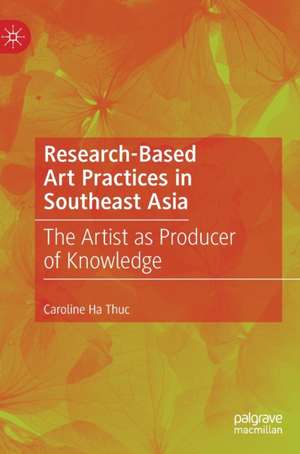Research-Based Art Practices in Southeast Asia: The Artist as Producer of Knowledge
Autor Caroline Ha Thucen Limba Engleză Hardback – 6 oct 2022
| Toate formatele și edițiile | Preț | Express |
|---|---|---|
| Paperback (1) | 637.93 lei 6-8 săpt. | |
| Springer International Publishing – 7 oct 2023 | 637.93 lei 6-8 săpt. | |
| Hardback (1) | 643.34 lei 6-8 săpt. | |
| Springer International Publishing – 6 oct 2022 | 643.34 lei 6-8 săpt. |
Preț: 643.34 lei
Preț vechi: 756.86 lei
-15% Nou
Puncte Express: 965
Preț estimativ în valută:
123.10€ • 134.14$ • 103.73£
123.10€ • 134.14$ • 103.73£
Carte tipărită la comandă
Livrare economică 23 aprilie-07 mai
Preluare comenzi: 021 569.72.76
Specificații
ISBN-13: 9783031095801
ISBN-10: 3031095804
Pagini: 283
Ilustrații: VI, 283 p. 12 illus.
Dimensiuni: 148 x 210 x 23 mm
Greutate: 0.5 kg
Ediția:1st ed. 2022
Editura: Springer International Publishing
Colecția Palgrave Macmillan
Locul publicării:Cham, Switzerland
ISBN-10: 3031095804
Pagini: 283
Ilustrații: VI, 283 p. 12 illus.
Dimensiuni: 148 x 210 x 23 mm
Greutate: 0.5 kg
Ediția:1st ed. 2022
Editura: Springer International Publishing
Colecția Palgrave Macmillan
Locul publicării:Cham, Switzerland
Cuprins
1. Introduction.- 2. Research-based art practices: Context and framework.- 3. Birth of a new art language.- 4. The artist-researcher.- 5. The artist producer of knowledge: cultural activism in Tiffany Chung’s The Vietnam Exodus Project (2009- ).- 6. Reactivating mythologies in Wah Nu and Tun Win Aung’s The Name series (2008- ).- 7. Beyond the artist’s discourse: implicit and sensuous knowledge in Khvay Samnang’s Preah Kunlong (2017).- 8. Emancipatory modes of knowledge production in Ho Tzu Nyen’s The Critical Dictionary of Southeast Asia (2003/2012- ongoing).- 9. Conclusion.
Notă biografică
Caroline Ha Thuc is a part-time Lecturer at Lingnan University, Hong Kong, as well as an independent art writer, researcher and curator. She holds a Ph.D. from the School of Creative Media at City University,Hong Kong, and is currently also a part-time researcher at the Guangzhou Academy of Fine Arts, China. Specializing in Asian contemporary art, Ha Thuc contributes regularly to different academic journals and magazines, focusing on the artistic production of knowledge. She has published books about the Hong Kong art scene as well as Japanese and Chinese contemporary art.
Textul de pe ultima copertă
This book is the first overall study of research-based art practices in Southeast Asia. Its objective is to examine the creative and mutual entanglement of academic and artistic research; in short, the Why, When, What and How of research-based art practices in the region. In Southeast Asia, artists are increasingly engaged in research-based art practices involving academic research processes. They work as historians, archivists, archaeologists or sociologists in order to produce knowledge and/or to challenge the current established systems of knowledge production. As artists, they can freely draw on academic research methodologies and, at the same time, question or divert them for their own artistic purpose. The outcome of their research findings is exhibited as an artwork and is not published or presented in an academic format. This book seeks to demonstrate the emancipatory dimension of these practices, which contribute to opening up our conceptions of knowledge and of art, bestowing a new and promising role to the artists within the society.
Caroline Ha Thuc is a part-time Lecturer at Lingnan University, Hong Kong, as well as an independent art writer, researcher and curator. She holds a Ph.D. from the School of Creative Media at City University,Hong Kong, and is currently also a part-time researcher at the Guangzhou Academy of Fine Arts, China. Specializing in Asian contemporary art, Ha Thuc contributes regularly to different academic journals and magazines, focusing on the artistic production of knowledge. She has published books about the Hong Kong art scene as well as Japanese and Chinese contemporary art.
Caracteristici
Analyses the issues at stake behind research-based art practices in Southeast Asia Approaches these art practices critically and clarifies their innovative combination of aesthetics and cognition Sheds light on the emancipatory dimension of these artistic forms of knowledge production
